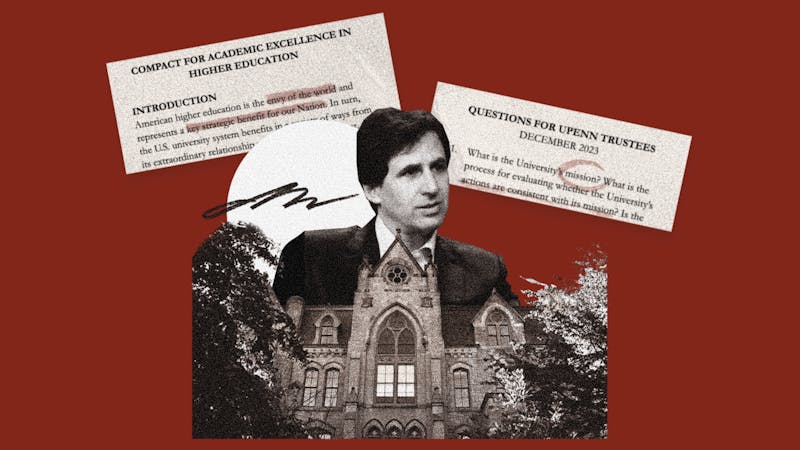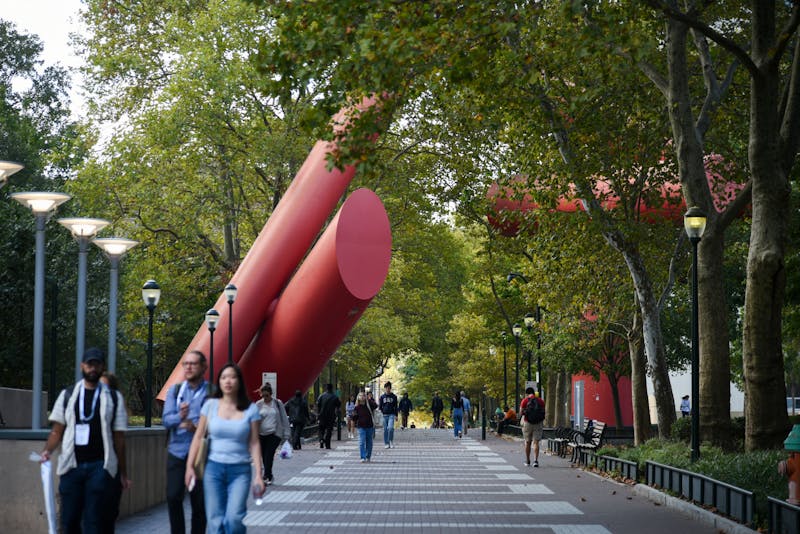
Damn, man: it's already December.
In 13 days, it will be about three-and-a-half months since I came back to Penn without all but one of my friends, seven months since I should have graduated with the rest and two full weeks since I wrote my last column for The Daily Pennsylvanian.
I can't wait to get out of this fucking place.
Yeah, you might think I'm going to miss the convenience of being attached to a dense concentration of youth. But every single time that I found myself jammed into this concentration's pure distillate -- Smoke's -- I would watch wavering and overdressed girls fall for or reject the same easy-talking points of drunk and predictably styled boys, and I would sip a Captain and Coke and drift into my own head. And from there I'd observe the tilting body language and the rocking, unfocused eyes of the drastically trashed, and calculate the stress as it deepened the tension lines in Joe Whipple's face, and there's something singular about the loneliness that comes when you are totally surrounded yet feel alone.
It is possible that once I'm gone, I will long for the sort of place to which big brains migrate. "When you get out there," an adult friend of mine said, "you'll really know what it's like to go face to face with idiots." And he may be right; despite some of the staggeringly ignorant and unsophisticated things that pass for Ivy League thoughts on this campus, there are probably far fewer idiots and many more sharp wits on Locust Walk than there are in the owner's boxes at Fenway Park.
But I've always felt that at Penn, the big brains that moved the mainstream were the ones designed for business, medicine or engineering. It's the preprofessionals that rule the culture at Penn -- them and the Greeks. And I will never be cut out for a cubicle at Citicorp. Plus, I totally suck at math.
This left me with a few choices: I could try to straddle the line between the intellectual and anti-intellectual forces at Penn; I could define myself in moral opposition to the other side; or I could join one of the institutions set up by aggravated Penn intellectuals so they could have a place to go and declare themselves God's official collective gift to mankind.
Thank God I found an outlet. It was here at the DP, where I wrote and edited for Street. This led me to a non-fiction seminar with Karen Rile. She was the first real writer to read my stuff and tell me I had something. I was a second-time freshman then. Karen was witty and passionate and wore great clothes.
Next came English 145. The teacher, Paul Hendrickson, met me while I still believed the lie that a recent ex-girlfriend had cancer and was going to die. He spotted my fragility with one glance and did everything he could to keep me and my fragile self-worth from imploding to shit. He would write me flattering e-mails, and inadvertently massage my writer's ego by reading my responses in class. Aside from my closest friends, Paul Hendrickson is one of the primary reasons I don't regret coming to Penn.
The other is Robert Wright. I'd been reading his stuff on Slate.com and had decided that he was a genius long before I realized he had a connection to this school. His columns, whose subjects ranged from terrorism to human nature to David Letterman, struck me as clever and utterly original, and his September 2002, nine-part series outlining a strategy for the war on terror is still one of the only things I've read on the subject that makes any sense, and I'm convinced that the implementation of policies approaching those he suggests may be the only thing that will keep Manhattan or its ilk out from under a mushroom cloud.
More importantly, his two significant books, The Moral Animal (about why humans are the way they are) and Nonzero (about the logic directing the history of the human species from where it began to where it is now), have fundamentally enriched my worldview, and provided highly defensible answers to many of the questions I've been asking since the interesting questions trickled into my head. The type of thinking driving the first -- that natural selection has hard-wired human beings with an essentially knowable set of tendencies -- and the second -- that the logic of nonzero cooperation is one of nature's strongest underlying laws -- is, I think, the type of thinking that gives a rational clarity to the world and may be the only type of thinking that can save it.
One year later, we're friends, and I've decided that I'm going to figure out a way to make Robert Wright's ideas household currency. I've got some promising leads: Bill Clinton has called Wright a genius in a number of his speeches, and the directors of The Matrix had Keanu Reeves read The Moral Animal before taking on the Neo role. I need more.
If you're interested, go to www.nonzero.org and have a look. If you're compelled, write me.
I think my fundamental problem at Penn was my failure to find some like minds. I've ended up doubting that any exist. I'm waiting to be proved wrong.Dan Kaplan is a senior History major from New York City.
The Daily Pennsylvanian is an independent, student-run newspaper. Please consider making a donation to support the coverage that shapes the University. Your generosity ensures a future of strong journalism at Penn.
DonatePlease note All comments are eligible for publication in The Daily Pennsylvanian.







